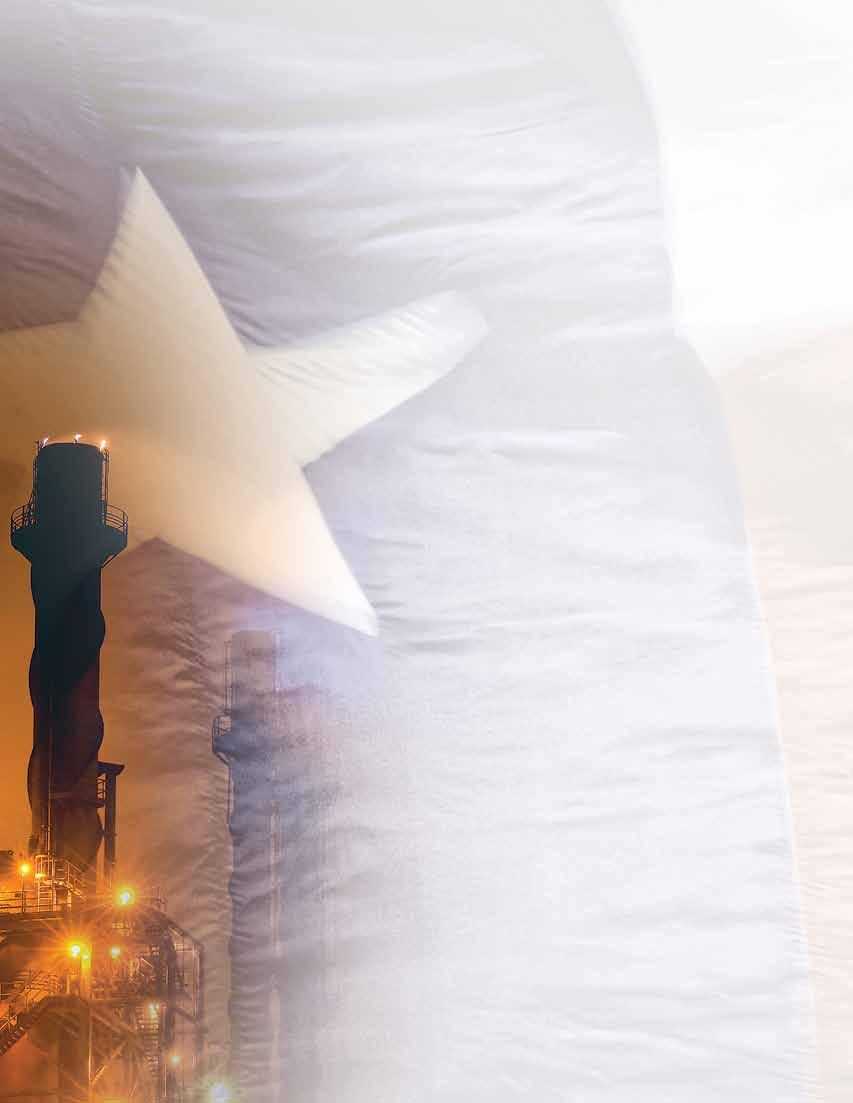
5 minute read
Flare Today, Gone Tomorrow: Update on Texas Flaring Regulations
from THL_JanFeb21
by QuantumSUR
FlaRe toDay, Gone tomoRRoW:
pipelines. Major producers, like Shell and BP for example, support the World Bank’s Zero Flaring by 2030 Initiative and have supported regulatory changes to reduce flaring.1 On the environmental
Update on side, the Environmental Defense Fund has taken a leading role in identifying environmental issues associated with flaring, including a significant contribution to carbon dioxide emissions, methTexas Flaring ane emissions (from gas that is vented directly without being burned, whether intentionally or from malfunctioning flares), and nitrogen oxide emissions (which contribute to smog and other local air quality issues).2
Regulations The Texas Railroad Commission (“Railroad Commission”) regulates flaring under Statewide Rule 32, which requires operators to apply for an exception
An unlikely coalition of royalty owners, pipeline companies, major producers, and environmentalists came together in 2020 to promote restrictions in to be able to release gas not otherwise allowed by the rule. The operator must show “the necessity for the release.”3 The rule explicitly considers “the unavailability of a gas pipeline or other marketing facility, or other purposes and uses authorized by law” Texas on the flaring of casinghead gas, a common byproduct of shale oil wells. Operators often flare gas when the well does not have a connection to a pipeline or other method for collect‘‘ For royalty owners and pipeline companies, the issue is to constitute “necessity” for casinghead gas.4 Opponents of flaring have noted that, in the last several years, the Railroad Commission has approved all or aling and transporting the financial: depend- most all applications for gas. As a result of the shale ing on lease terms, exceptions.5 As a result boom and new shale wells royalty owners may of the increased excepoutpacing the infrastructure for transporting gas, flaring not receive royalties tions and the increased amount of flaring overall, in the Permian Basin and on flared gas.” the Railroad Commission the Eagle Ford has increased faced pressure in 2020 to over recent years. Estimates of the address this issue. In November 2020, amount of flared gas vary, but sources after public hearings and a comment agree that the amount of gas flared annu- period, the Railroad Commission voted ally exceeds the residential consumption to change the form required for an exof natural gas in Texas. ception application. Currently, operators For royalty owners and pipeline com- may use either the old or new form; the panies, the issue is financial: depending new form will likely become mandatory on lease terms, royalty owners may not in spring 2021 as part of a shift to an onreceive royalties on flared gas. Pipeline line submission system. According to the companies lose out on revenue when gas Railroad Commission, the changes to is flared rather than transported in their the form will reduce flaring by (1) reduc-
ing the time period for which an operator can obtain an administrative exception to flare, (2) providing incentives to use technology to reduce flaring, (3) requiring more specific information justifying the need for the exception, and (4) requiring additional information to assist in auditing reported production.6
Other changes are likely to follow. Environmental groups in particular are not satisfied with these changes, pointing out that they do not actually require a reduction in flaring and do not address the release of methane via malfunctioning flares. Major producers support the World Bank’s “Zero Routine Flaring by 2030” program, and the Biden administration appears interested in stopping the rollback of rules on methane emissions.
Two bills, HB 896 and HB 897, have been filed for the 2021 Texas Legislative session to address this issue as well.7 HB 896 would require the Texas Commission on Environmental Quality to develop regulations to limit flaring and venting, while HB 897 would require a study of how to use existing regulations and incentives to reduce flaring. Newly elected Railroad Commissioner Jim Wright also released a statement after the Commission’s January 26, 2021 open meeting, emphasizing that applicants for exceptions to the flaring rules must provide sufficient information to demonstrate a true need for flaring.8 On February 9, 2021, the Railroad Commission deferred some applications for flaring, including one that sought to flare over a million dollars’ worth of natural gas, to investigate the facts of the applications further.9 Commissioner Wright and Commissioner Wayne Christian both indicated an interest in reducing routine flaring (as opposed to emergency flaring) and taking a harder look at applications for exceptions.
Despite the lack of significant change to Statewide Rule 32, operators can expect the Railroad Commission to demand strict compliance with the rules as well as evidence supporting the claimed basis for flaring. Whether the Railroad Commission’s new approach to enforcement of the existing regulations dampens the momentum for more extensive legislative or regulatory changes remains to be seen.

Carly Milner is a partner at Fogler, Brar, Carly Milner is a partner at Fogler, Brar, O’Neil & Gray, LLP, practicing commer-O’Neil & Gray, LLP, practicing commercial litigation. She is also a member of The cial litigation. She is also a member of The Houston Lawyer Editorial Board. Houston Lawyer Editorial Board.
endnotes
1. See Letter from David Lawler, Chairman & CEO, BP Am.,
Inc. & Gretchen Watkins, President, Shell Oil Co., to the
Railroad Commission of Texas (Sept. 4, 2020), https:// www.bp.com/content/dam/bp/country-sites/en_us/united-states/home/documents/public-statements/railroadcommission-swr-32-comment-letter-and-zrf-principles. pdf. 2. Ben Ratner, A Zero Flaring Policy is Long Overdue, and Investors Can Help Make It Reality, ENV’T
DEF. FUND (May 27, 2020), http://blogs.edf.org/ energyexchange/2020/05/27/a-zero-flaring-policy-islong-overdue-and-investors-can-help-make-it-reality/. 3. 16 TEX. ADMIN. CODE ANN. § 3.32(f)(2). 4. Id. § 3.32(f)(2)(D). 5. Kiah Collier, Pipeline Giant Sues Railroad Commission, Alleging Lax Oversight of Natural Gas Flaring, TEX. TRIB.,
Dec. 3, 2019, https://www.texastribune.org/2019/12/03/ railroad-commission-sued-lax-oversight-natural-gasflaring/. 6. RRC’s Commissioners Take Action to Reduce Flaring by Oil and Gas Industry, TEX. RAILROAD COMM’N (Nov. 9, 2020), https://rrc.texas.gov/news/110920-rrc-conferenceflaring-action/. 7. Kyra Buckley, 2 Texas House Bills Look to Curb Natural
Gas Flaring, HOUS. PUB. MEDIA (Jan. 6, 2021), https:// www.houstonpublicmedia.org/articles/news/energyenvironment/2021/01/06/388716/lawmakers-couldaddress-natural-gas-flaring-in-upcoming-session/. 8. Commissioner Wright Statement on Flaring Exceptions,
TEX. RAILROAD COMM’N (JAN. 26, 2021), http:// www.rrc.state.tx.us/news/012621-commissioner-wrightstatement-on-flaring-exceptions/. 9. E.g., Kevin Crowley & Rachel Adams-Heard, Texas Oil
Regulator Signals Flaring Crackdown After Backlash,
BLOOMBERG (Feb. 9, 2021, 11:45 a.m.), https://www. bloomberg.com/news/articles/2021-02-09/texas-oilregulator-defers-natural-gas-flaring-permit-requests.









